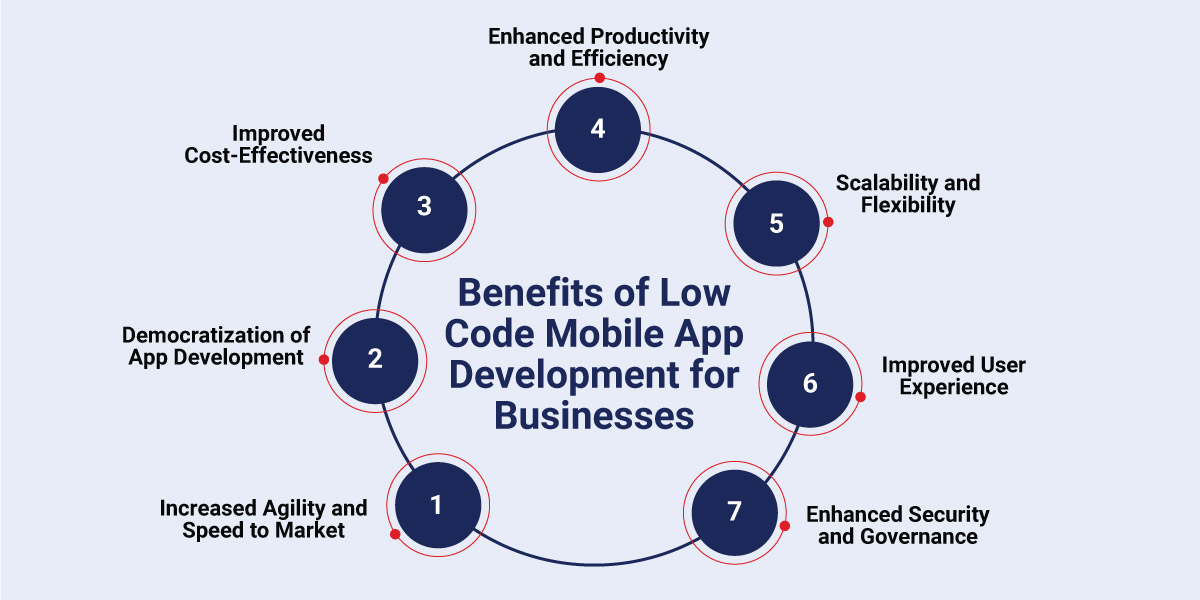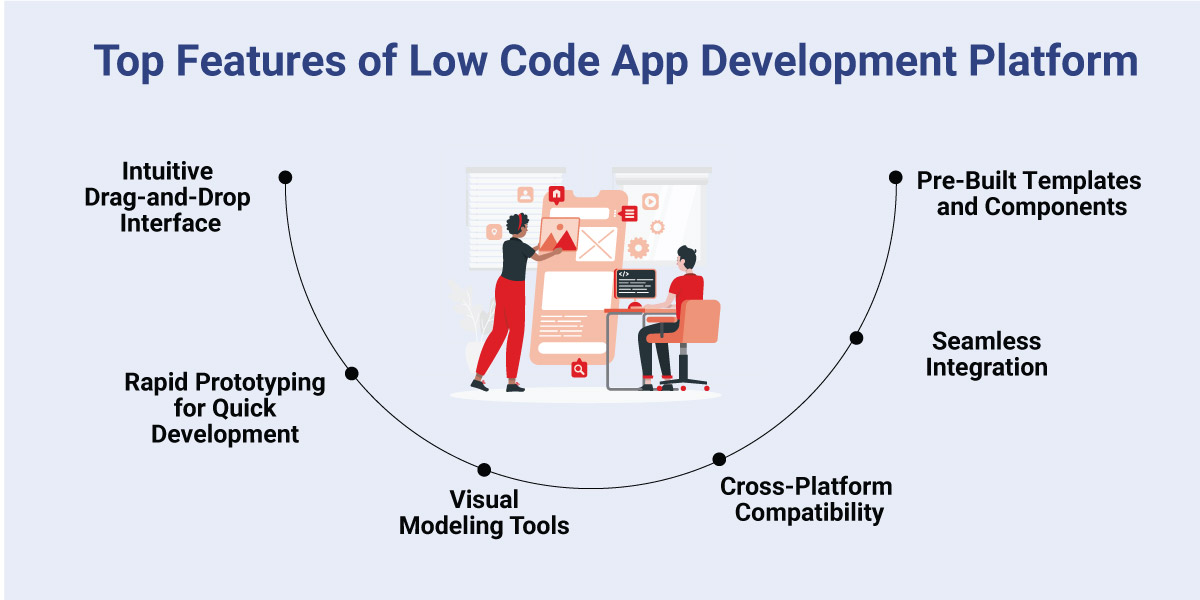Extensive coding, long development cycles, and high costs are the components of the complex and time-consuming traditional mobile app development process. But thanks to low-code app development’s modular, model-driven development approach, it enables agility, speed, and scale that minimizes the conventional challenges, enabling enterprises to see through disruptions and build better and faster apps.
This blog post explores the benefits and key features of low-code mobile app development along with major challenges and solutions to overcome them.
Defining Low Code Development for Mobile Apps
It is a visual approach to mobile app development that enables faster delivery of apps with minimal manual coding and minimal upfront investment in setup and training. This approach utilizes visual tools, drag-and-drop functionality, and customizable pre-built elements to develop mobile apps, bypassing the necessity of coding from the ground up. The primary goal is to minimize the time and cost associated with app development to speed up and simplify app development.
Key Benefits of Low Code Mobile App Development for Businesses
For enterprises looking to improve their app development operations, a low-code platform is a game changer with numerous benefits. The approach of low code simplifies the process, reduces costs, and unlocks several key benefits for businesses of all sizes. To offer you a deep understanding of all these aspects, let us dive into the key benefits of low-code app development.

Increased Agility and Speed to Market
Building apps, the traditional way can take a lot of time and resources. But this innovative technology and its user-friendly features, such as drag-and-drop interfaces and pre-built components, facilitate rapid prototyping and development cycles. It adopts agile development methods that help enterprises define new possibilities for their business growth.
This offers faster time-to-market for new apps and allows businesses to seize opportunities and respond to market shifts quickly.
Democratization of App Development
The traditional view of app development often involved complex coding, accessible only to experienced programmers. Mobile low-code development platforms are breaking down the traditional barriers by democratizing app creation and making it accessible to a broader range of people within the organization.
Improved Cost-Effectiveness
Low-code app development platforms eliminate the need for large teams of professional developers and help you reduce development costs significantly. Also, the pre-built components and cloud deployment options lower infrastructure expenses, making it the most cost-effective mobile app development solution for any enterprise.
Enhanced Productivity and Efficiency
This innovative app development revolution offers built-in functionalities like API integrations and data management, further optimizing development processes. This approach helps streamline workflows and reduce coding errors, which ultimately enhances the productivity and efficiency of the overall organization.
Scalability and Flexibility
Low-code apps enable speed and scale, which allow enterprises to quickly adapt apps to growing user bases and changing business needs. Also, these platforms often offer modular components that can be easily added or removed as requirements evolve. This is how it offers better scalability and flexibility to the enterprise to create apps according to their requirements.
Improved User Experience (UX)
It provides pre-designed UI elements and templates, ensuring a consistent and user-friendly app experience. Many low code platforms also offer tools for user testing and feedback integration that enable continuous UX improvement. With this benefit, the enterprise can evaluate its diverse requirements, which can be fulfilled with this exceptional technology of low-code apps.
Enhanced Security and Governance
Reputable low-code platforms prioritize security with features like,
- Role-based access control
- Data encryption
- Secure deployment options.
Moreover, these platforms often ensure compliance with industry regulations.
Top Features of Low Code App Development Platform
Discover the key features of mobile low code development platforms and how it streamlines app development process with enhanced efficiency and accessibility for your organization.

Intuitive Drag-and-Drop Interface
Low code app development’s user-friendly interface allows you to design your app through an intuitive and straightforward drag-and-drop interface. Therefore, citizen developers too can actively contribute to the app development process with the help of a visual interface approach.
Rapid Prototyping for Quick Development
One of the significant advantages of low-code platforms is the ability to create prototypes easily. It allows developers to build and test app concepts quickly. This accelerates the development cycle, making it possible to refine and iterate ideas without the traditional time constraints associated with coding from scratch.
Visual Modeling Tools
It is considered a cornerstone feature of low-code app development. Visual modeling offers a clear, concise way to represent complex workflows and data flows for non-technical users or low-code developers. This leads to a faster development process with fewer errors.
Cross-Platform Compatibility
Why limit your audience when mobile low-code development platforms inherently support cross-platform development? You can build an app that seamlessly runs on iOS and Android without extensive platform-specific coding. This cost-effective solution expands your platform reach without extra development efforts.
Seamless Integration
Developers can seamlessly integrate their apps with popular services like payment gateways, social media, and analytics tools. This enhances the functionality and user experience of the app and saves time.
Pre-Built Templates and Components
The low-code platform comes with a vast library of pre-built templates and components. This includes ready-to-use UI elements, features, and integrations. Leveraging these resources allows the team to significantly reduce the development time and ensure that the app has a consistent and polished appearance.
Common Low-Code App Development Challenges and How to Overcome Them
Although low code app platform offers numerous advantages, it comes with its own set of challenges. This section will explore some common app development challenges and provide actionable insights on overcoming them.
Limited Customization Options
Challenge: Some low-code platforms restrict your ability to create highly customized or complex apps, potentially limiting developers’ creativity.
Solution:
- Carefully choose the right low-code platform or a professional low-code app development company that can guide you to a platform that balances ease of use, integration capabilities and customization.
- As an enterprise, opt for platforms that provide extensibility through custom code integration and ensure they meet specific requirements when necessary.
Integration Challenges
Challenge: Integrating low-code apps with existing systems and third-party tools can be challenging, leading to data silos and inefficient processes.
Solution:
- Prioritize low-code platforms that support robust integration capabilities.
- You must look for solutions offering pre-built connectors or APIs, which makes connecting with commonly used enterprise systems and databases easier.
Scalability Concerns
Challenge: As your app grows in complexity and user base, some low-code platforms may struggle to help you scale efficiently.
Solution:
- Evaluate platforms that are specifically designed to handle increased workloads and user volumes without sacrificing performance.
- Consider cloud-based options for improved scalability.
Security Risks
Challenge: Rapid development features of low-code apps can sometimes lead to an oversight in security measures, exposing low-code apps to potential vulnerabilities.
Solution:
- Prioritize security throughout the development lifecycle and conduct thorough security testing before deploying the app.
- Invest in a platform that adheres to industry standards, offers built-in security features, and provides regular updates and patches.
Vendor Lock-In
Challenge: Over-dependency on a single low-code vendor can result in vendor lock-in, limiting flexibility in the long run.
Solution:
- As an enterprise, you need to use a platform that supports open standards and allows easy migration of apps to other platforms.
- Keep an eye on vendor roadmaps and choose vendors committed to interoperability.
Lack of Skilled Developers
Challenge: Finding developers with expertise in specific platforms can be challenging. It also hampers the growth and maintenance of your apps.
Solution:
- Invest in training programs for your existing development team or hire a dedicated low-code app development services provider.
- Opt for a low-code platform with a supportive community and ample learning resources.
Building Scalable Cross-Platform App with Low-Code Mobile App Development Platform
Get the potential of cross-platform app development effortlessly through the innovative power of low-code mobile app development platforms. These platforms offer many features, from reusable components to pre-configured templates, eliminating the need for repetitive manual coding tasks.
You don’t have to wait for prolonged development timelines – low-code platforms come equipped with visual modeling tools and drag-and-drop interfaces. Efficiently and promptly design and iterate on app layouts and functionalities, significantly reducing time-to-market. This simplicity enables developers and non-technical users to contribute seamlessly to the app development process.
Integration capabilities within low-code platforms facilitate smooth interoperability with existing systems and services. This not only enhances mobile app functionality but also optimizes the flow of data. The emphasis on code sharing and reuse across various platforms minimizes duplication in development efforts, making low-code platforms indispensable for boosting productivity and speed in cross-platform app development.
So, build scalable cross-platform apps efficiently and bring your ideas to life quickly and easily with low-code app development.
Examples of Low Code Mobile App Development Platform
Let’s explore some of the most popular low-code platforms for mobile app development and their standout features:
Microsoft PowerApps
Popularity: Popular choice for businesses already invested in the Microsoft ecosystem.
Strengths: Deep integration with Microsoft 365 and Azure, extensive pre-built connectors for data sources and services, suitable for building internal business apps and chatbots.
Mendix
Popularity: Delivers speed and agility which makes it a preferred choice across various industries.
Strengths: Versatile platform building cross-platform mobile apps, web apps, and PWAs with a drag-and-drop interface, offering offline support, push notifications, and external data integration.
OutSystems
Popularity: It is the ideal choice for building and deploying complex mobile apps.
Strengths: Powerful visual development environment, extensive library of pre-built components for mobile apps and web solutions.
Why Should You Choose Rishabh Software for Low-Code Mobile App Development?
As a prominent low-code app development company and Microsoft Solutions Partner, we are your ideal choice for accelerating your business performance. We bring extensive knowledge of Power apps and the entire Power Platform ecosystem. We expedite your business performance by harnessing the power of Power Platform development services through:
- Power Apps
- Power Automate
- Power Pages
- Power BI
- Microsoft Copilot Studio
- Dataverse
We go beyond just building apps. We’re your one-stop solution for building futuristic app development with our capabilities, such as,
- The automation capabilities of Power Automate
- The data visualization proficiency of Power BI
- The AI-powered chatbot competency of Microsoft Copilot Studio.
So, partner with us to streamline your IT resource allocation, accelerate time-to-market, and adopt digital inclusivity with our innovative low-code development approach. When you think about rapid innovation and agile development, we’re the ones who can fulfill all your requirements in no time.
Frequently Asked Questions
Q: What are the low-code app development trends?
A: Here are some future trends for low-code app development:
AI-Powered Efficiency
Leverage of AI and ML in low-code platforms for intelligent coding recommendations and task automation, significantly reducing development time and errors.
Citizen Development Empowerment
It is evolving to empower non-technical users in program development. User-friendly tools enable corporate users to actively engage in creating functional apps tailored to their specific needs.
Progressive Web Applications (PWAs)
It offers a hybrid approach between web and native mobile apps, gaining momentum in low-code platforms. With a single codebase, businesses can reach a broader audience thanks to growing support for PWA development.
DevOps Integration
Integrating DevOps capabilities within low-code platforms streamlines communication between development and operational teams, automating testing, deployment, and monitoring procedures for quicker and more reliable app delivery.
Multi-Experience Apps
Low-code expansion beyond traditional web and mobile apps allows developers to create apps for diverse channels like voice interfaces, AR, VR, and wearable tech, enhancing user engagement.
Q: How does low-code accelerate digital transformation?
A: Low-code accelerates digital transformation by simplifying the app development process. With visual interfaces and drag-and-drop functionality, it enables faster creation of apps, reducing the overall development time.
By empowering both developers and non-developers, low code bridges the tech talent gap, allowing for the quick deployment of customized, scalable solutions. Integration with existing systems, cost reduction, and simplified app life cycle management further contribute to the rapid pace of digital transformation.
Q: Why Should You Consider Low-Code App Development for Your Enterprise?
A: You should consider low-code app development for its ability to accelerate app development, reduce costs, and foster collaboration between technical and non-technical teams.
The speed and efficiency of low-code platforms enable rapid deployment, addressing market demands promptly. Whether it be agility, scalability, or seamless integration capabilities, low code development in the enterprises ensures adaptability to evolving business needs and easy incorporation into existing IT infrastructure.
These platforms’ inherent security features and compliance standards make them a valuable tool for businesses aiming to stay competitive and agile in today’s fluctuating market.








